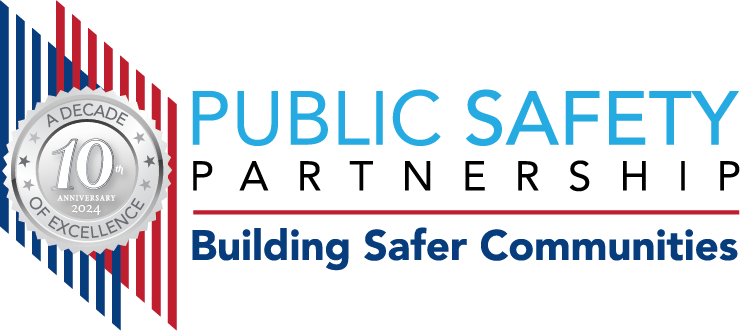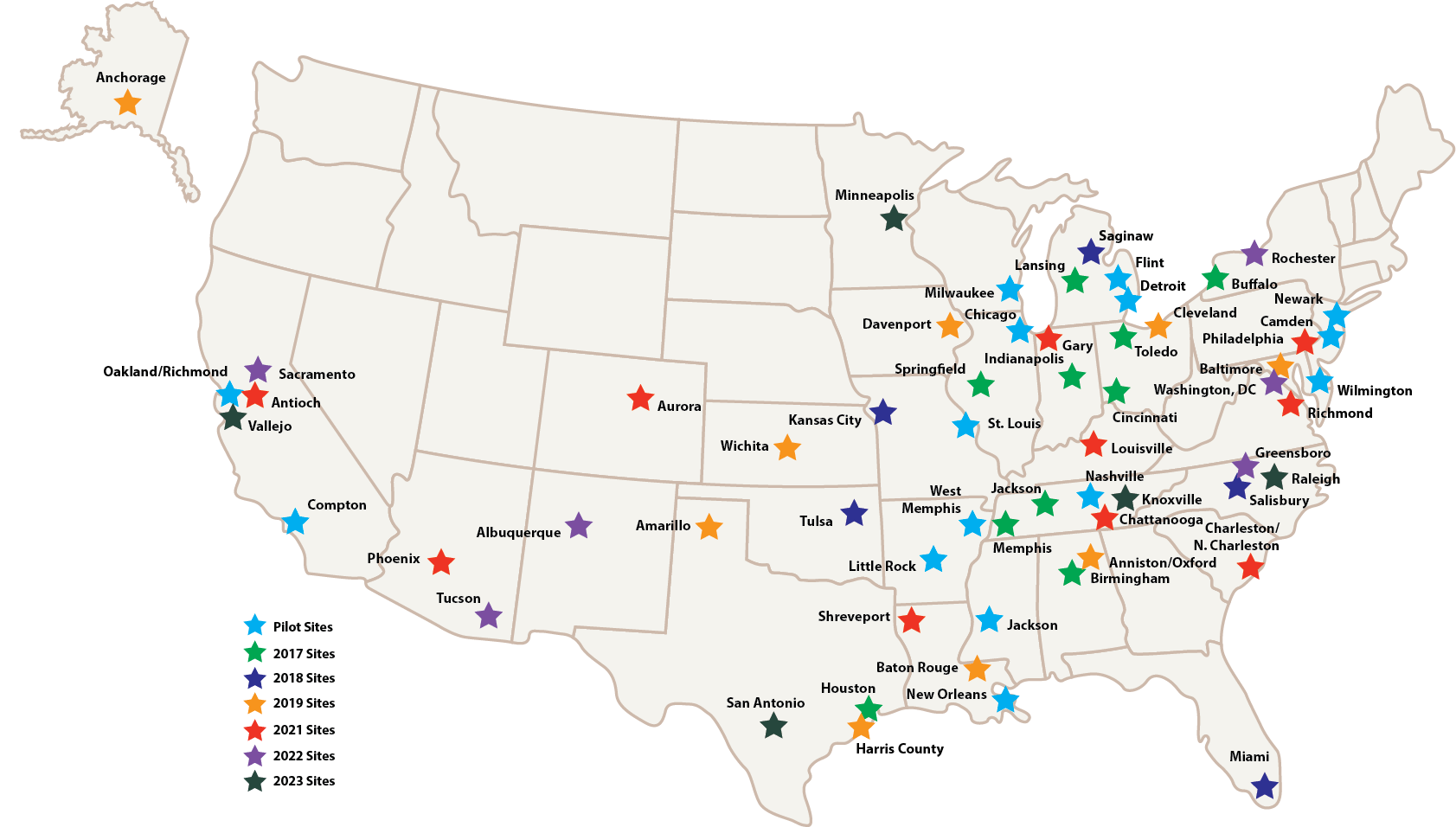Coordinated by the Bureau of Justice Assistance (BJA), the U.S. Department of Justice's National Public Safety Partnership (PSP) was launched to help communities suffering from serious violent crime problems to build up their capacity to fight crime. PSP provides an innovative framework to enhance federal support of state, local, and tribal law enforcement and prosecution authorities in enhancing public safety.
Available Funding
There are not currently any funding opportunities available through this program.
Sites
On December 4, 2024, the Department of Justice announced the addition of five new PSP sites, leading to a total of 67 cities that have participated in PSP to date.
Success Stories
Learn how different areas around the country have been positively impacted through participation as a PSP site:
The Cuyahoga County, Ohio, Prosecutor’s Crime Strategies Unit has grown from 2 staff to 15 staff. The Cleveland Division of Police increased the number of homicide detectives from 12 to 18, changed its on-call schedule to enhance the Homicide Unit’s effectiveness, improved its “Murder Book” concept, and implemented a 90-day review of open cases.
In 2017, the Baltimore, Maryland’s eastern and western police districts reported 104 of the city’s 342 homicides. As of July 2020, these two districts — which now are served by Baltimore’s new Baltimore City Intelligence Centers (BCICs) — account for only 43 homicides. As of March 2021, there are currently three BCICs in operation.
In April 2021, Amarillo, Texas, PSP partners teamed with San Jacinto Elementary on a project to encourage families to read together. Each student received a copy of the book Bat and the Waiting Game. PSP partners recorded themselves reading a chapter of the book, and families can view and read along with the PSP partners each day.
The Davenport, Iowa, Police Department (DPD) started the Good Neighbor Project in January 2020. As of April 2021, there are 84 neighborhoods signed up for the program. The program brings together the City of Davenport, Davenport Police Department, and the community to help make the community comfortable with the police in their neighborhoods and develop connections with neighborhood groups.
Also, the DPD focused on developing a regional approach to gun crime through the National Integrated Ballistic Information Network (NIBIN). DPD purchased NIBIN technology in 2019, which has resulted in 589 investigative cases entered, generating more than 255 investigative leads.
The FBI provided advanced training and investigative support to the Wichita, Kansas, Police Department (WPD) using forensic genealogy and ancestry approaches, resulting in positive outcomes for multiple cold cases. Despite difficult circumstances during the pandemic, WPD concluded 2020 with a 100 percent solve rate for all 2020 homicides.
The Camden County, New Jersey, Police Department (CCPD) created a real-time tactical operation intelligence center. CCPD engages in a “virtual patrol” from this center by assigning staff to proactively monitor high-crime areas or current calls for service. Camden is currently experiencing historic lows in violent crime.
PSP training and technical assistance helped CCPD streamline ballistics evidence processing, incorporate social network analysis, and integrate technology into its daily operations. The department now acts as a model site for the PSP Technology Community of Practice and is nationally recognized for its community engagement efforts.
The Chicago, Illinois, Police Department developed Strategic Decision Support Centers (SDSCs) that use integrated, real-time analytics to support decision making. SDSCs were piloted in two districts historically at high risk for violence; these pilot districts experienced a 33 percent reduction in shooting incidents. SDSCs have since been expanded to all Chicago police districts.
The Los Angeles, California, County Sheriff’s Office developed partnerships with the U.S. Attorney’s Office and federal law enforcement agencies to enhance policing efforts through enhanced investigations, analysis, and community engagement efforts. These enhanced partnerships and processes contributed to a 40 percent increase in gun prosecutions and a 50 percent decrease in gang-related shootings from August 2017 to August 2018.
The Detroit, Michigan, Police Department (DPD) implemented Project Green Light, a collaboration among law enforcement and more than 700 local businesses to prevent and respond to crime through environmental design and priority call response. Carjackings citywide declined 38 percent from 2016 to 2019, and fatal and nonfatal shootings declined 27 percent since 2016.
DPD completed its engagement with PSP in 2016. During this time, PSP provided funding to Michigan State University (MSU) to establish an embedded crime analyst project with DPD and its partners. MSU embedded seven trained crime analysts in the Detroit Police Department, the Wayne County Prosecutor’s Office, the Detroit Public Schools Police Department, and the Michigan Department of Corrections. Through the PSP partnership, DPD established a Domestic Violence Fatality Review Board to collaboratively review domestic violence-related deaths to prevent and decrease domestic violence homicides, which contributed to a 35 percent reduction in domestic violence-related homicides.
Under PSP, the West Memphis, Arkansas, Police Department developed Operation Data Enhanced Targeted Enforcement and Restoration (Operation DETER) to identify and focus on chronic violent offenders and high crime neighborhoods, supplemented with increased community engagement and social media communication. Nine months after the implementation of Operation DETER, West Memphis experienced a 16 percent reduction in violent crime.
Memphis, Tennessee, ended its engagement with PSP in September 2020. The Memphis PSP site attributes the 13 percent drop in violent crime between 2017 and 2019 to the local, state, and federal partnership strengthened through PSP.
The Metropolitan Nashville, Tennessee, Police Department enhanced community relationships through a collective efficacy initiative developed through PSP support, which contributed to a 42 percent reduction in serious violent crime from 2017 to 2018 in pilot neighborhoods.
Anchorage, Alaska, began its engagement with PSP in 2019. Halfway into 2020, homicides in Anchorage decreased over 50 percent and property crimes decreased 40 percent compared to the same time period in 2019, with 6 homicides in 2020 compared to 19 in 2019.
The Tulsa, Oklahoma, Police Department received state and federal funding in 2019 to launch a victim services program and hire victim advocates. PSP provided training and technical assistance that enabled the department to implement best practices for law enforcement-based victim services. The victim specialists are now integral partners in all violent crime investigations.
In January 2020, the Harris County, Texas, Sheriff’s Office (HCSO) completed a grants landscape review. That year, HCSO received a Community Policing Development Microgrants Program Award from the Office of Community Oriented Policing Services. The HCSO grant manager also implemented a grant committee with representatives from HCSO, the Harris County District Attorney’s Office, and the United States Attorney’s Office-Southern District of Texas, which meets quarterly to discuss funding needs and potential opportunities.



